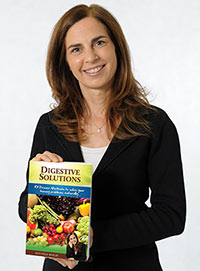![]()
By Michèle Wolff B.H.Sc Naturopathy, Dip. Colonics and Author of ‘Digestive Solutions’
We’ve seen a lot written about sugar in the media lately. Should you quit it completely? Are there times when it’s good for you? Has the expert view changed on what you should be eating?
The simple answer is that refined sugar is bad for your health. Too much of it can increase your blood glucose levels making you more susceptible to diseases such as diabetes, build up as fat stores in the body, and change the make-up of important cells in the body.
Sugar is highly addictive, so just cutting it out of your diet may be very difficult for many people.
Here are some simple tips for reducing sugar in your diet.
- Go for a natural substitute
Stevia is a natural sugar substitute made from the leaves of a South American shrub. It’s around 300 times sweeter than white sugar and as a non-nutritive sweetener has almost no kilojoules. Its low-carb content also means it has a negligible effect on blood sugar levels.
- Eat fruit
If you need a sweet treat, eat fruit. Not juice, not fructose, but the whole fruit. While you’ll be consuming fructose, it will be in balance with all the other nutritional benefits of the fruit so is far better for you. Aim for two pieces of fruit daily (and five serves of vegetables!) The best fruit options, where the fructose is lower than glucose, are stone fruit, berries and citrus fruits, as well as ripe bananas, kiwi, passionfruit, pineapple, rhubarb and tamarillo.
- Introduce new ingredients
Changing your ingredient list is a great way of introducing some new flavours. Try using coconut oil in recipes for a delicious flavour, or by adding coconut nectar you can add sweetness without any sugar. Make a fabulously creamy chocolate mousse by combining half an avocado, a small banana and a teaspoon of organic cacao.
- Cut down on protein and fat
Sounds strange, but a craving for sweets and white flour (another refined product) can be caused by eating a diet too high in protein or fat. Bringing more balance into your diet may help reduce sugar cravings.
- Consider magnesium
If you find your sweet tooth is harder to ignore around your period, add more magnesium to your diet, such as dark leafy greens, mackerel, brown rice, buckwheat and avocados.
- Herbs and spices
Adding herbs and spices such as cinnamon or vanilla can add a touch of sweetness, or try liquorice tea for a 3.30 pm pick-me-up.
- Avoid processed foods
Most processed foods are full of sugar, even savoury foods! It’s not difficult to make a tomato relish instead of using bottled sauce, or to have a bowl of oats in the morning instead of your packaged cereal. Sugar is hidden in almost everything you can buy at the supermarket! Where possible, try cooking from scratch.
- Eat consciously
Read the ingredients, cook from scratch when you can, and take every effort to actively avoid sugar in your diet. IN 1900, the average person consumed about 5kg of sugar in a year. Now, that consumption is up to 75 kg! Even cutting down a small amount, over a continuous period, will make a big difference to your overall health.
- Stay away from the soft drinks
A senior executive from one of the biggest soft drink companies in the world recently admitted to a whopping 44 teaspoons of sugar being found in a large cinema-serve of their iconic drink. Plain water is far more refreshing and if you really need it flavoured, try adding a squeeze of lemon or lime (but rinse your mouth in plain water afterwards to avoid damaging the enamel on your teeth) or a sprig of mint.
- Reward yourself
Set yourself small targets to reduce sugar in your diet and reward yourself when you reach your goals. Treat yourself to a new magazine or even a break from your daily work!
However you’re choosing to cut down your sugar intake, remember you’re making small changes that will have a big impact on your overall and future health. Be proud of yourself!
Michèle Wolff is a leading health practitioner and a qualified naturopath, nutritionist, herbalist and nurse, owner of Ultimate Detox Solutions www.detoxspecialist.com.au. Her new book ‘Digestive Solutions – 101 Proven Methods to Solve Your Tummy Problems Naturally’ is available from bookstores and good online booksellers. Visit www.digestivesolutions.com.au RRP $39.95





